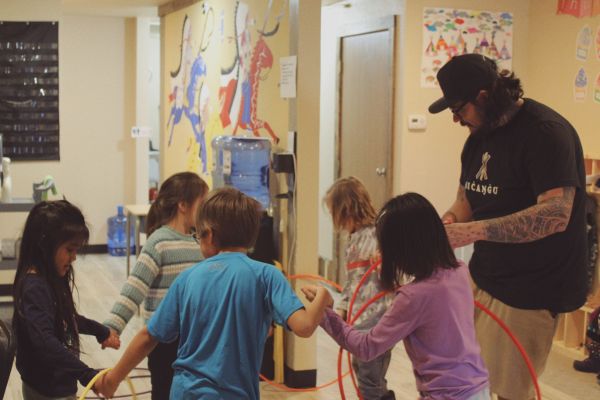
- Details
- By Kaili Berg
Now in its fourth year, the school is making strides with students to develop lifelong language learners who will preserve both the Lakota language and culture.
“The families and children who understand it are intellectual human beings and have the capacity to be economically independent,” Sage Fast Dog, the school’s founder and director, told Native News Online. “Over the last 150 years, schools have not been successful with Native Americans doing that. That’s why this school needed to be put in place. We have to take back our education.”
The program has more than 30 kindergarten through third-grade students taught primarily in Lakota in language.
The goals of the Wakanyeja Tokeyahci Wounspe Ti program include developing fluent Lakota language speakers; supporting students in learning about Lakota culture, traditions, and ways of being; honoring ancestors and elders; and developing the whole child.
“We want to make sure our kids are always secure wherever they go,” Fast Dog said. “Doing that is largely about holistic wellness, eating healthy, socializing with each other, and being who they are no matter where they go in this world where there are very few speakers.”
Teachers in the immersion program learn alongside the students with fluent speakers as mentors and monitors in the classrooms.
“Pairing a fluent speaker with a new teacher is the whole idea of moving everyone along at the same time,” Leland Little Dog, a fluent language speaking at the school, told Native News Online. “The advantage is they get to learn what I know because I am not trained in the classroom like them.”
Carm Shouldis, a teacher at the school, works alongside Little Dog in the immersion classes. Before, she did not see herself as someone who knew enough of the language to become a teacher. She trusted the process and developed a passion for teaching and language through her work in the program.
“I knew I was passionate about Indigenous education for children as a Lakota Teacher,” Shouldis said. “It means a lot to our children and they need to see themselves and their teachers succeed.”
Not only are students getting to learn their language, but they are fully immersed in Lakota culture as they share space learning songs, dance, and culturally significant stories and teachings.
“That’s why this school is important,” Fast Dog said. “We are thinking long term, we want our kids to be there, and we want our families to know that we value where we want to be. It’s going to take some time to get there.”
More Stories Like This
Hanging a Red Dress for Christmas: MMIP, Native Higher Education, and Hope for a Better New YearNative Students Can Win $5,000 Scholarship, International Distribution in Pendleton Design Contest
American Indian College Fund Raises Alarm Over Plan to Shift Native Programs Away From the Dept. of Education
MacKenzie Scott Foundation Gives $5 Million Contribution to Little Priest Tribal College
Tribal Leaders Push Back on Dismantling of U.S. Department of Education
Help us defend tribal sovereignty.
At Native News Online, our mission is rooted in telling the stories that strengthen sovereignty and uplift Indigenous voices — not just at year’s end, but every single day.
Because of your generosity last year, we were able to keep our reporters on the ground in tribal communities, at national gatherings and in the halls of Congress — covering the issues that matter most to Indian Country: sovereignty, culture, education, health and economic opportunity.
That support sustained us through a tough year in 2025. Now, as we look to the year ahead, we need your help right now to ensure warrior journalism remains strong — reporting that defends tribal sovereignty, amplifies Native truth, and holds power accountable.
 The stakes couldn't be higher. Your support keeps Native voices heard, Native stories told and Native sovereignty defended.
The stakes couldn't be higher. Your support keeps Native voices heard, Native stories told and Native sovereignty defended.
Stand with Warrior Journalism today.
Levi Rickert (Potawatomi), Editor & Publisher


